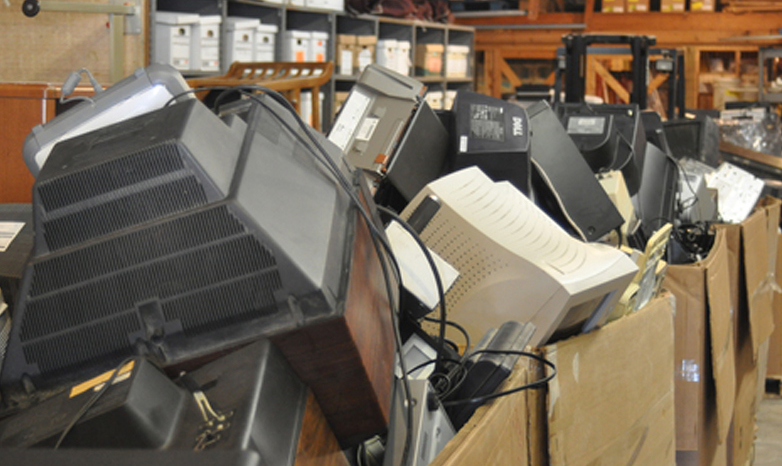SRU’s e-waste recycling program protects environment

SRU will collect old televisions, cell phones, computers and other electronics during its April 22-23 Community E-Waste Recycling Days program. Items can be dropped off from 10 a.m. to 2 p.m. at the Recycling Center on Kiester Road.
April 19, 2016
SLIPPERY ROCK, Pa. - Ah, the dilemma: you just bought a new computer, game console or television and you're wondering what to do with your old electronic devices. Here's a word of advice from the experts. Do not throw them in the trash, dump them in a field or pitch them in a ditch. All of those actions are illegal.
Instead, you can dispose of them properly during Slippery Rock University's April 22-23 Community Electronic Waste Recycling Days.
Items can be dropped off from 10 a.m. to 2 p.m. both days at SRU's Recycling Center at the Stores II facility on Kiester Road. Dumpsters will be located in the parking lot. To protect personal information, organizers caution, computer hard drives should be removed and destroyed.
The recycling program, part of the University's Earth Days 2016 program, is aimed at keeping electronics out of landfills, where toxic waste could seep into the ground.
"We do this event because it is illegal to put electronics in the trash now," said Joel Brown, interim assistant director for environmental health and safety. "Landfills and trash companies no longer accept these items so people just throw the stuff along the roads and in farmer's fields. Our event gives people a free, legal option to get rid of this stuff."
The list of acceptable electronic waste includes any type of cell phone, televisions, computers, printers, MP3 players, VCRs, keyboards, power chords, copiers, scanners, consoles and stereo equipment. Only batteries from laptops or UPS's will be accepted.
Unacceptable items include paint, oil, cleaning supplies, medications, light bulbs, dishwashers, refrigerators and air conditioning units.
Brown said the electronic waste would be picked up and processed by Maven Technologies in of Rochester, New York. Last year, the program netted 18 pallets of electronics. Cell phones will be donated to the Hope Phone Program, which makes secondhand cell phones available to people in Africa.
In the tech industry, hoarding or disposing of used electronic waste is known as e-waste. The amount is growing every year. In 2015, consumers worldwide pitched 92 billion pounds of used electronics, according to a report by the United Nations University; the research arm of the United Nations.
The Blacksmith Institute, a non-profit organization focusing on global pollution, estimates that toxic e-waste threatens the health of 100 million people worldwide.
"Electronics have to be recycled to avoid environmental damage and save resources, especially since many electronic devices have a very short useful life," said Paul Scanlon, special assistant to the president for sustainability. Cell phones and laptops tend to be used for only five years or so before they become obsolete or are replaced."
One of the world's largest producer of electronics, Apple, recently recovered gold from its recycling of technology. According to the Huffington Post, the tech company recovered 2,204 pounds of gold from recycled devices, worth $43.6 million. Many of Apple's products include gold. Each iPhone, for instance, contains 25 milligrams of gold.
SRU efforts to dispose of waste responsibly have been extended to other materials, including scrap metal. In 2015, SRU recycled 1 million pounds of scrap metal. The scrap metal was sold, reaping $130,475 to support campus grounds and facilities costs.
SRU's strategic plan commits the University to using sustainable processes and procedures.
There is no charge for SRU's e-waste recycling program. For more information visit: http://www.sru.edu/Documents/about/sustainability/2016 e-waste collection program description.pdf?1461077851477&1461077851477
MEDIA CONTACT: Gordon Ovenshine | 724.738.4854 | gordon.ovenshine@sru.edu

